
How To Remove the Two Factor Authentication From iPhone 13

How To Remove the Two Factor Authentication On Apple iPhone 13
Want To Remove the Two Factor Authentication? Check Out This Guide
Continuous technology innovation has introduced many advanced encryption and security methods to protect data from hackers. With these innovations, companies like Apple and Google have introduced the two-factor authentication process to protect user data.
But sometimes, this security method becomes a hassle to access your data daily, due to which many users try to remove it. That is why, in this article, we have discussed how you can remove iCloud two-factor authentication easily.
- Part 1: What Is Two-Factor Authentication and How Helpful It Is
- Part 2: Can You Remove the Two Factor Authentication iCloud at Anytime
- Part 3: How To Remove the Two-Factor Authentication Within 14 Days
- Part 4: iPhone Apple ID Got Locked? Here’s a Reliable Tool To Get It Unlocked Without Passcode

Part 1: What Is Two-Factor Authentication and How Helpful It Is
Protecting users’ devices and online accounts is one of the major responsibilities of tech companies like Apple. Due to this, they have added multiple security features, including two-factor authentication. Thus, if you create an Apple ID, you can see a two-factor authentication option that adds an extra layer of security.
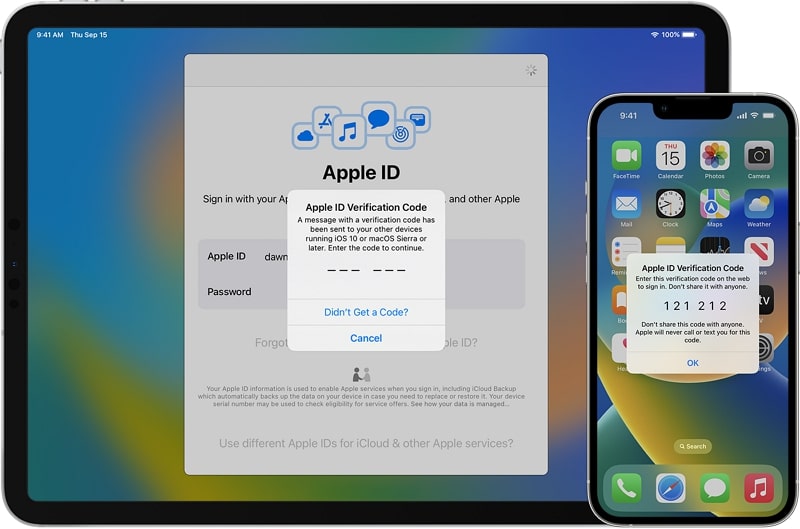
2FA is activated when the user provides the password to log into the Apple ID or software through a new device, and it acts as a second layer for account security. Apple ID or any software containing sensitive data cannot be accessed without it. This method provides a higher security level than single-factor authentication. To understand more benefits of this security system in detail, check the following points:
- Protection From Password Theft: 2FA acts as an additional security level. It protects your accounts and devices in case your password is leaked.
- Migrations of Unauthorized Assets: Online banking applications use 2FA to protect users from unauthorized bank transfers. If someone accesses their app, this is a beneficial security measure.
- Protection on Multiple Services: Platforms, including social media, banks, and cloud storage, use 2FA. It means that 2FA can be used in various digital aspects.
Part 2: Can You Remove the Two Factor Authentication iCloud at Anytime
Many people use 2FA globally to protect their personal information and devices from hackers and unauthorized access. However, in some cases, users may want to remove two-factor authentication iCloud for multiple reasons. This includes scenarios in which their device is lost or damaged or if they have found a better security option than this one.
Moreover, there is one important key point to note: Apple has removed the feature of deactivating 2FA from the Apple ID. It means you need to think twice before activating this feature on your Apple ID because it cannot be reversed. For the following reasons, Apple has taken this initiative:
- Enhanced Security: By removing the deactivation option for 2FA, Apple is trying to strengthen its account security to ensure that no one can access its user’s data.
- Reducing Vulnerabilities: Allowing users to deactivate 2FA could cause vulnerabilities in the Apple ecosystem that can be a weak point for protecting users’ data. That is why Apple has removed the deactivation option to stop malicious actors from taking advantage of this vulnerability.
- Encouraging Security Awareness: To make Apple users more security conscious, Apple has made it difficult on purpose to remove 2FA. It helps users to be more confident in Apple services and products.
- Minimizing Mistakenly Steps: If users mistakenly remove the 2FA, their accounts and devices are at risk of being accessed without proper authentication. To avoid such an issue, the deactivation option of 2FA is removed.
Besides all these reasons, there is still some good news for those who want to remove the two-factor authentication iPhone to use other security options. The good news is that Apple allows users to remove 2FA for a limited time after activation.
Part 3: How To Remove the Two-Factor Authentication Within 14 Days
As explained in the last part, Apple has made removing the 2FA option from Apple ID challenging for several security reasons. Thus, if you want to remove 2FA from your Apple ID, you have only 14 days after activating this feature. To understand how to disable iCloud two-factor authentication within this given time, check the following steps:
- Step 1. Once you have activated the 2FA feature, your 14-day grace period will start eventually. To deactivate this, open the enrollment email you received from Apple regarding 2FA on your Apple ID.
- Step 2. Scroll to the bottom of this email and select the link or button to return to your account security & settings section. There, follow the on-screen instructions to deactivate the 2FA of your Apple ID.
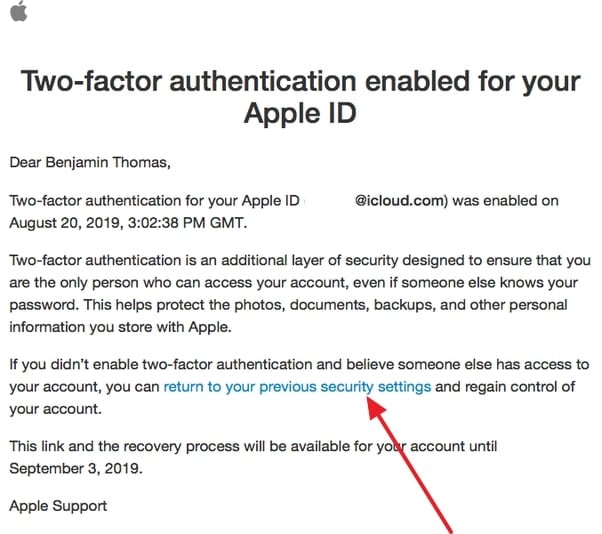
Part 4: iPhone Apple ID Got Locked? Here’s a Reliable Tool To Get It Unlocked Without Passcode
If you mistakenly got your Apple ID locked due to entering the wrong password multiple times, there is no need to stress it out. It is a common issue that many people forget their Apple ID password and cannot access it. Due to this, we have got you a perfect solution to unlock your Apple ID without a passcode.
This solution is the Wondershare Dr.Fone - Screen Unlock (iOS) tool specially designed to help users remove their iPhone and iPod lock screens. It is compatible with the latest iOS devices and assists in removing various types of lock screens, including Touch ID and Face ID.
Key Features
- This iOS screen unlock tool assists users in bypassing MDM without data loss and other technical errors.
- iCloud activation lock and iTunes backup encryption can be bypassed without a password in just a few steps.
- iPhone 15 and the latest versions of iOS 17/iPadOS 17 are supported by this tool to help users professionally.
Simplified Steps for Unlocking Apple ID With Wondershare Dr.Fone
To help you use this AI-powered screen unlock tool for unlocking the Apple ID without a password, follow the process we have mentioned below for your ease:
- Step 1. Access the Toolbox and Choose the Respective Option
Initiate the process by accessing Wondershare Dr.Fone’s latest version on your computer and tapping on the “Toolbox” option from its left side toolbar. Following this, choose “Screen Unlock” from the list of tools and tap “Remove Apple ID” in the next window.

- Step 2. Make Sure That the Apple iPhone 13 Is Connected to the Computer
Then, connect your Apple iPhone 13 to your computer using a USB cable so that you can see its connectivity status. Once the status is displayed on a new window, hit the “Unlock Now” button to proceed. Answer some questions that are asked by the platform, and with this, ensure that your device’s “Screen Lock” and “Two-Factor Authentication” are enabled or disabled.
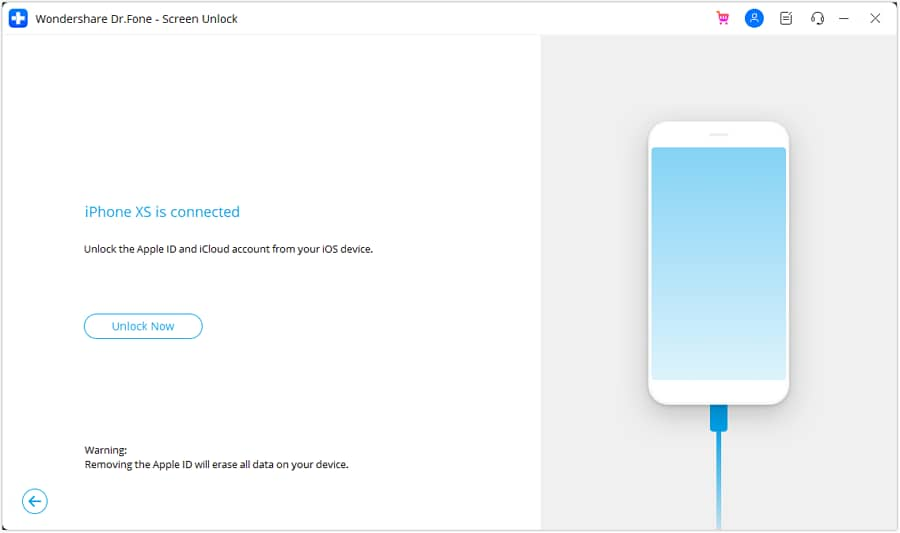
- Step 3. Select the System Version and Proceed Ahead
In this step, enable Recovery Mode by following the on-screen instructions. It will help the platform detect the connected device model, with which you will need to select “System Version.” Afterward, you can hit the “Start” button to proceed ahead.
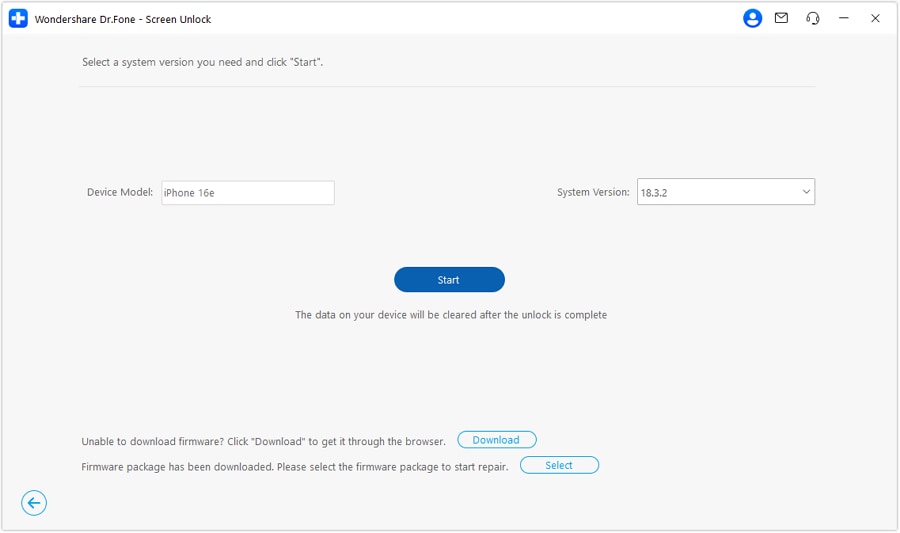
- Step 4. Start the Apple ID Unlocking Process
The respective iOS firmware will download according to the Apple iPhone 13 device model and system version. After it is downloaded, the platform will verify it for you, based on which you can tap the “Unlock Now” option to get your Apple ID unlocked successfully.
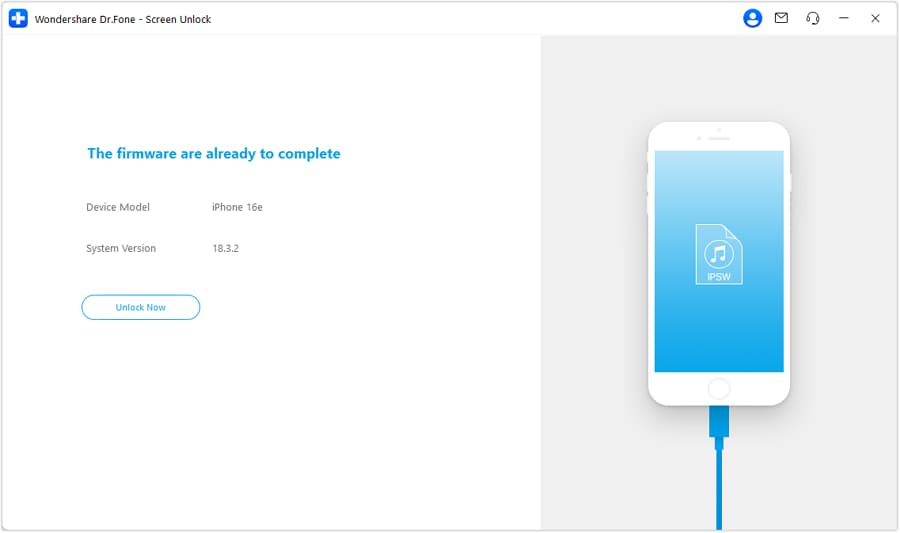
Conclusion
With this, we hope you understand how to disable iCloud two-factor authentication. However, remember that doing this is only possible within 14 days of a grace period. If this period is over, you cannot remove 2FA from your Apple ID.
Moreover, if you have locked your Apple ID passcode, using Wondershare Dr.Fone to unlock it can be the perfect option. While using this tool, you also don’t have to worry about screen locks on different iOS devices. This is because the innovative algorithms integrated in this tool make it easier to use for unlocking the Apple ID or screen lock.
How to Fix Locked Apple ID on Apple iPhone 13
Part of why you own and use Apple devices is the reliability of the Apple iPhone 13 devices and the ease of using them. This starts with the quality of hardware and the synergy with the software that runs the hardware, and the user experience you get. Apple puts great emphasis on this, and rightly so, for this is one of the keys defining and differentiating factors for people to choose Apple’s iOS over Google’s Android. Like with all good things in life, sometimes, a spanner is put in the works that bring your smooth-sailing life to an abrupt halt. With smartphones playing pivotal roles in our lives today, from payments to internet experiences to getting work done to stay in touch with people, anything that stops us from using our smartphone or endangers that experience is a cause for worry. A locked Apple ID is one such thing. It does not happen frequently, in fact, most users will never experience a locked Apple ID, but for the ones who are fortunate enough to have such a rare experience in life, help is at hand. All you need to do is relax and read on. By the end of it, you will have an unlocked Apple ID and you can go back to cruising.
Part I: Difference Between Activation Lock and Locked Apple ID
Apple being Apple, does a lot to make sure that users get the smoothest experience possible when interacting with their Apple products, both hardware, and software. Yet, sometimes, the messaging gets confusing, and people are not sure what is what. One such thing is the difference between iCloud Activation Lock and Apple ID Lock. While people are more likely to encounter Activation Lock and less likely to encounter Apple ID Lock, they are often confused when they encounter Apple ID Lock and struggle to figure out what that means and how to resolve the issue.
Activation Lock is when your supported Apple device is locked for a number of reasons. The most common reason is a stolen device that was locked by its owner, however, there are other perfectly valid reasons such as an outgoing employee forgetting to sign out and erase their Apple device before submitting it back. The IT department would not be able to reset that device without turning off Find My Apple iPhone 13 and Activation Lock on the Apple iPhone 13 device.
A locked Apple ID usually happens when the user has forgotten their password to their Apple ID account and attempts to figure out the password have been unsuccessful. Sometimes, Apple ID gets locked automatically under some conditions, and that requires users to reset their password to gain access. A locked Apple ID does not mean that your device is locked for your use. You can keep using it so long as you do not try to use another Apple ID with it since to do that you would have to sign out of your current Apple ID (which is locked) and you won’t be able to do that. On the other hand, Activation Lock renders the entire device unusable till the lock is cleared.
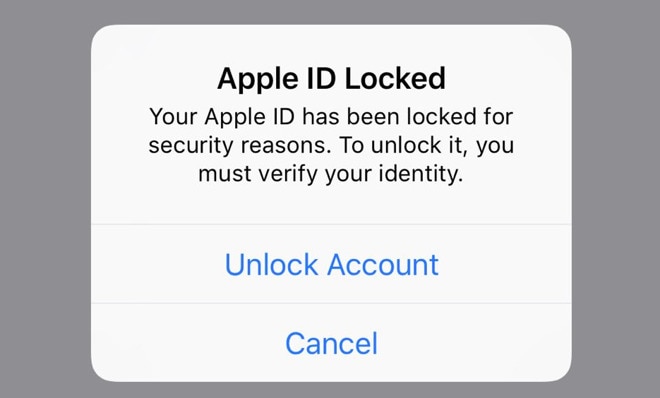
In short, Apple ID Lock is about a user’s account with Apple, akin to how Google Account works on Android devices. Apple ID Lock locks a user’s account with Apple while retaining complete usage of the Apple iPhone 13 device whereas Activation Lock locks the Apple iPhone 13 device and prevents anyone from using it until the correct credentials are entered. This is about verifying the ownership of the Apple iPhone 13 device and works to deter theft of Apple devices.
Part II: Checking If Your Apple ID Is Locked
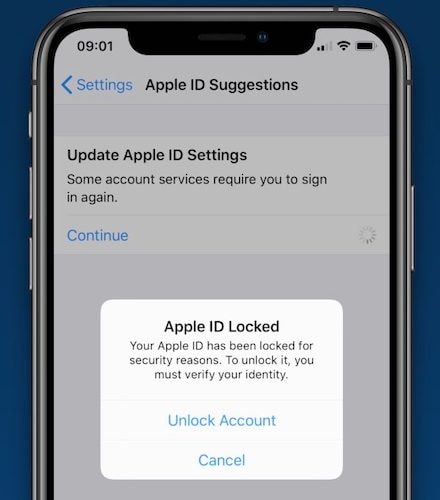
A locked Apple ID is rather unmistakable. Your device would keep telling you that your Apple ID is locked for your security. Your Apple ID could be locked or disabled altogether if someone has tried to gain access to your account (and, obviously, failed). Apple would disable access to the Apple ID unless you are able to prove rightful ownership and reset the password successfully.
Part III: Reasons for Locked Apple ID
There can be a few reasons why your Apple ID is locked. You forgot the password and now it is locked since you entered the wrong password too many times. A scarier prospect, albeit a real one, is that some malicious actor attempted to login into your Apple ID account but failed. Had they succeeded, you would have gotten a message that ‘your Apple ID is being used on another device’ now.
Apple does a lot to ensure that your Apple ID remains safe. You trust Apple with a lot of your data, including financial data by way of your credit cards associated with Apple ID to make purchases on the App Store and iTunes Store. Therefore, some of the time, Apple preempts issues by proactively locking up your Apple ID or even disabling it. It goes without saying that sometimes it is something so simple as a software error that is believed to have locked up Apple IDs for many users around the world a while ago. It is also entirely possible that it was some malicious actor probing the servers for accounts.
All of these will result in a locked Apple ID that users will have to reset their password to in order to gain access back.
Part IV: How to Unlock Apple ID on Apple iPhone 13
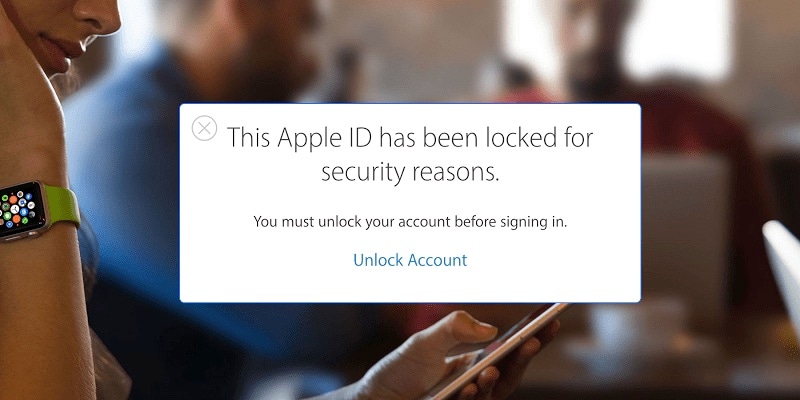
It is unfortunate you are facing a locked Apple ID. Apple tries its best to make users aware of safety protocols they need to follow to minimize and mitigate such unfortunate occurrences, such as using two-factor authentication, trusted devices, trusted phone numbers, passwords, passcodes, etc. that serve as deterrents to prevent unauthorized access to devices and accounts. Yet, when the unfortunate happens, what to do?
IV.I: Unlock Apple ID Via Two-Factor Authentication
Apple implemented two-factor authentication a long time ago to prevent unauthorized access to Apple ID accounts. If you have it enabled, you would be able to use two-factor authentication to unlock your Apple ID again.
Step 1: Go to https://iforgot.apple.com .
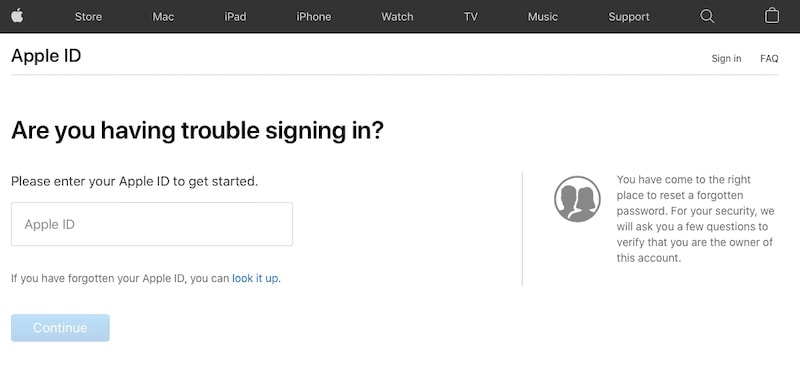
Step 2: Key in your Apple ID and proceed.
Step 3: Confirm your mobile number associated with the Apple ID.
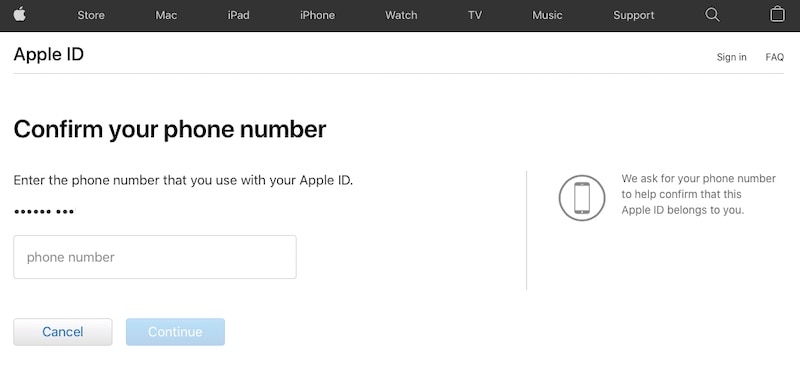
If you have another device associated with the Apple ID and it is a trusted device, you can now receive instructions to proceed with a two-factor code on that device.
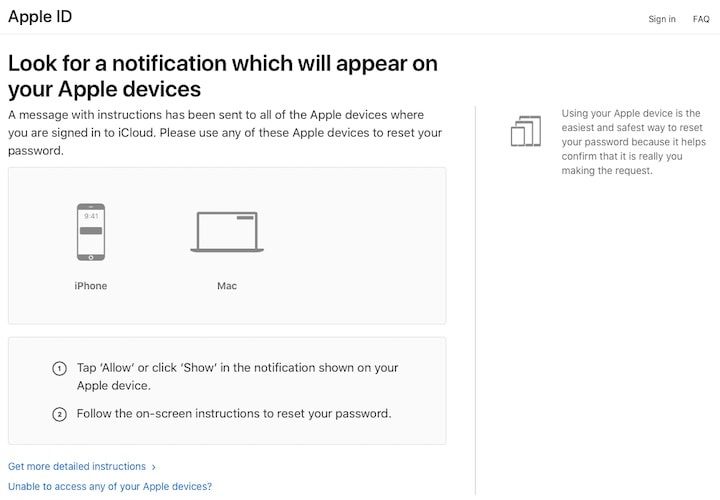
Step 4: Use that code to unlock your Apple ID using two-factor authentication.
IV.II Unlock Apple ID Via Dr.Fone - Screen Unlock (iOS)
Dr.Fone is a name that will be instantly familiar to anyone who has ever had any issue with their mobile devices and would be able to vouch for the quality and efficacy of this software at fixing issues quickly and efficiently.
Dr.Fone is a collection of carefully crafted modules that helps you when most needed. Ranging from helping you wipe your devices securely with Data Eraser to maintain your privacy when you sell your device or give it to service and helping you erase not just junk on your device but also user data such as SMS (whether single or batch) to free up some space on your Apple iPhone 13, to Phone Transfer that helps you to easily transfer data you’re your old phone to your new Apple iPhone 13 including restoring from iCloud Backups, Dr.Fone is a venerable utility from Wondershare that does it all and lives up to its name. Naturally, this tool was designed to help you unlock your Apple ID as well.
Step 1: Download Dr.Fone.
Step 2: Launch Dr.Fone and select the Screen Unlock module.

Step 3: Click Unlock Apple ID to start the process.
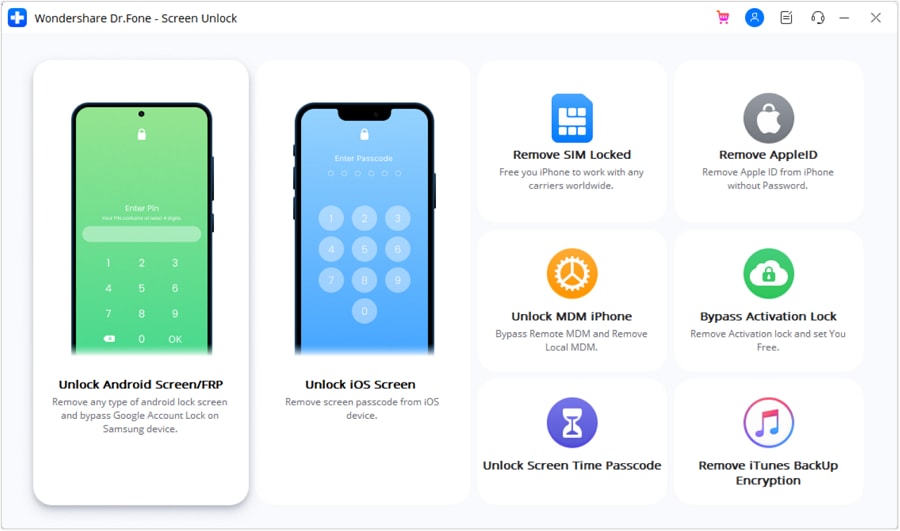
Step 4: Connect your device to the computer and wait for Dr.Fone - Screen Unlock (iOS) to detect it. You must know the passcode of your device.
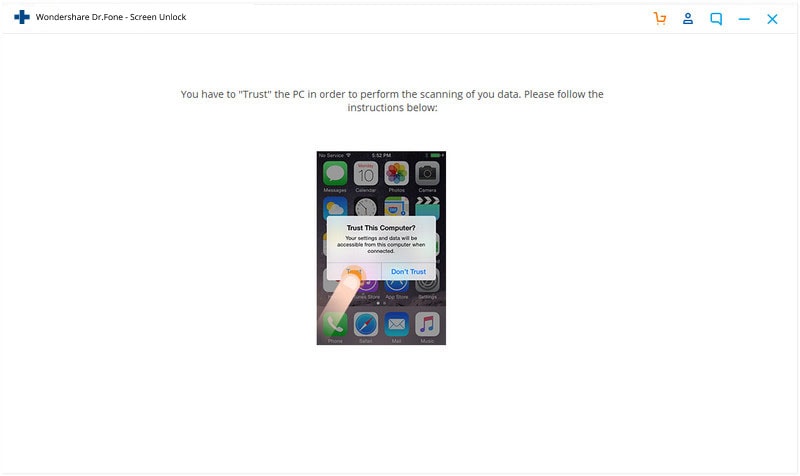
You will be asked on your Apple iPhone 13 to Trust the computer, and then you will need to enter the passcode.
Step 5: Unlocking Apple ID via Dr.Fone - Screen Unlock (iOS) will erase the contents of the Apple iPhone 13 device. You need to confirm this by typing six zeroes (000 000) in the popup.

Step 6: Follow the on-screen instructions to reset all your settings on the Apple iPhone 13 and then reboot to start the unlocking process.
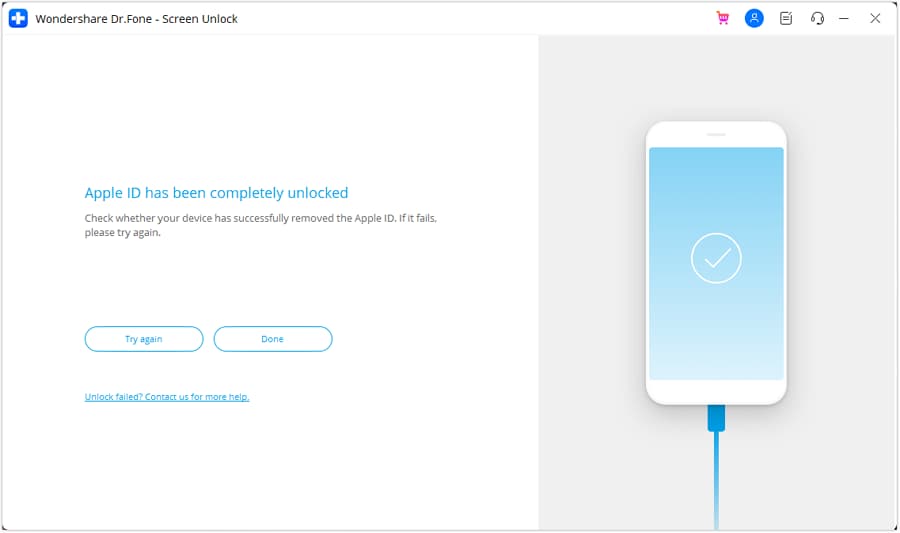
Dr.Fone - Screen Unlock (iOS) will notify you when the process is complete.
Part V: Conclusion
Considering how much the Apple ID is pivotal to our Apple experience, it can be incredibly unnerving to realize that it is locked or disabled, due to any reason. We use our Apple ID for iCloud services on Apple devices, to make purchases on iTunes Store and App Store and payments using Apple Pay. Apple knows this and has checked in place to make sure that only you are in possession of your Apple ID account at all times. It can cause a little hassle at times, since if someone makes multiple failed attempts to gain access to your account, Apple will lock your Apple ID until you can unlock it with proper verifications and reset your password.
Removing Device From Apple ID For your Apple iPhone 13
Has the latest iPhone taken your attention lately? With a new Apple device in use, you might have cluttered a lot of devices under a single Apple ID. You can face multiple issues when you turn to backup content or save it on your Apple ID. It might be possible that the data of some other Apple device gets restored onto your new Apple device, which is never your priority.
This leads to removing unwanted devices from the Apple ID. If you are about to sell out or close down a device in the future, it is best to remove the Apple iPhone 13 device from Apple ID. This will help you save yourselves from the complicated conditions created by having multiple devices on the same Apple ID.
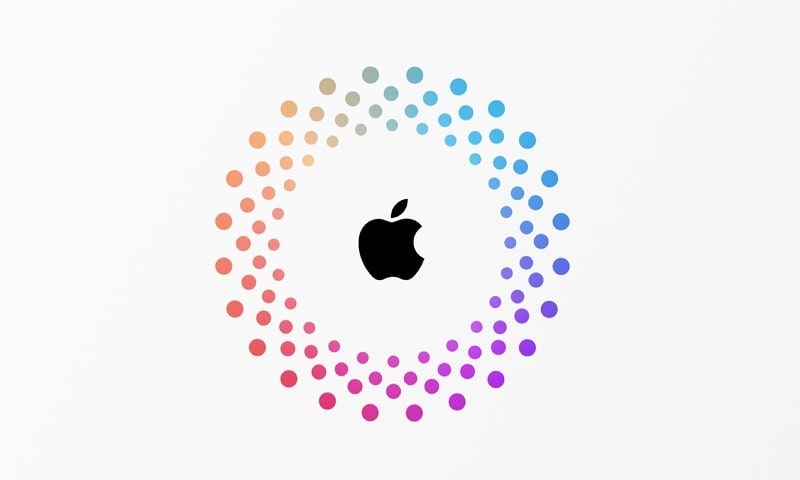
Part 1: Should I Remove Old Devices From My Apple ID?
Why should one look to remove their old devices from the Apple ID? There are multiple reasons involving the methods of removing devices from Apple ID. Before we get to the methods, let us first review why this is needed:
- Managing Devices on Apple ID: If you consider removing the Apple iPhone 13 devices from the Apple ID, this will help you keep track of all the associated devices with your credentials. Devices that have been sold and are not linked are not your responsibility to manage.
- Avoid Notifications and Updates: For devices that are old and will be sold out by you, you might receive notifications and updates. To avoid them, it is best to remove the Apple iPhone 13 device from your Apple ID to stop all notifications and updates.
- Protection of Privacy: When a device is sold out, it is best to remove it from your Apple ID to avoid breaching personal information. Someone else might try accessing or receiving your data.
Part 2: 4 Ways to Remove a Device From Apple ID
You would’ve surely understood the reasons for removing a device from the Apple ID. This can help you propagate into understanding the multiple techniques of performing this action. We have outlined some unique methods for removing Apple devices. To know how to remove the Apple iPhone 13 device from Apple ID, find out more about these methods below:
Method 1: Using an iPhone, iPad, or iPod Touch
The first and most straightforward technique of removing devices from Apple ID is through iPhone, iPad, or iPod Touch. If you wish to remove a device from your Apple ID, use any of the available Apple iOS devices and continue with these steps:
Step 1: Start by opening the “Settings” application on your iOS device and select your name displayed on the top.
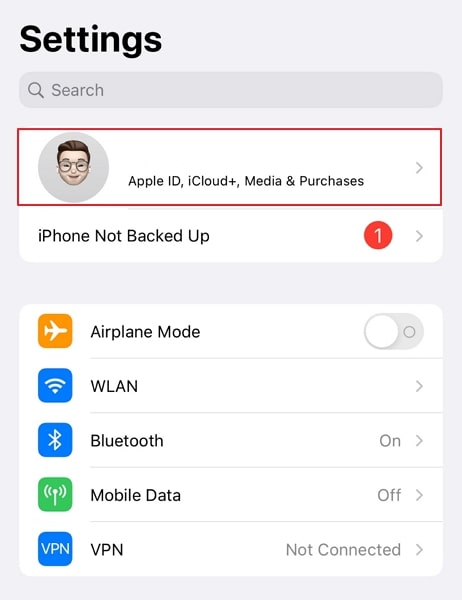
Step 2: On the next screen, find the Apple iPhone 13 devices connected to the same Apple ID. Select the particular device that you wish to remove from the ID.
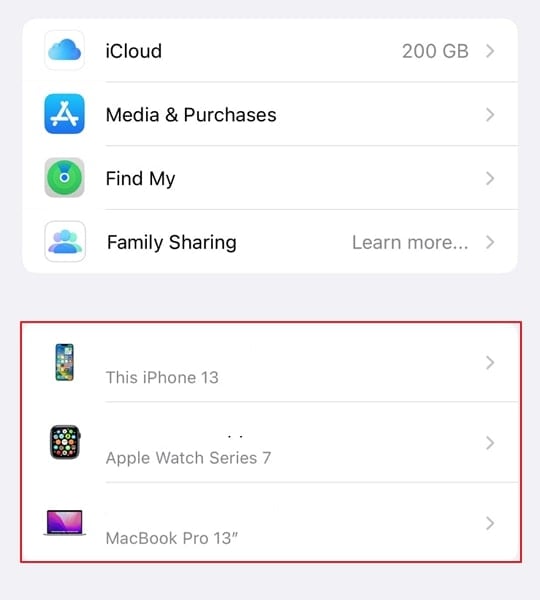
Step 3: As you proceed into the next window, find the “Remove from Account” option for executing the task. Once selected, you will be prompted again, where you have to select “Remove” to confirm the actions.
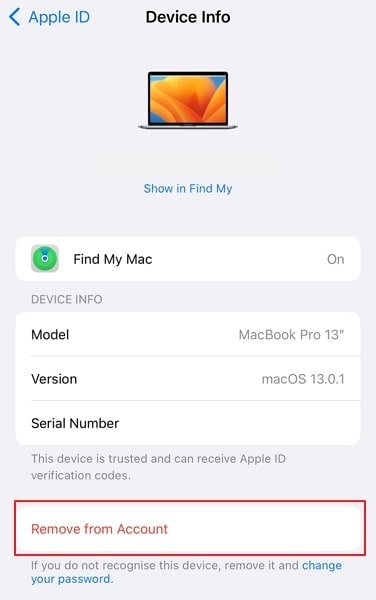
Method 2: Using a Mac
You can also try using your Mac to remove a particular device from your Apple ID. To do that perfectly, it is best to use the following steps as a guide for removing the Apple iPhone 13 device:
Step 1: Launch your Mac and click on the “Apple” icon displayed on the top-left of the screen. Next, you have to tap on the “System Settings” option from the drop-down menu.
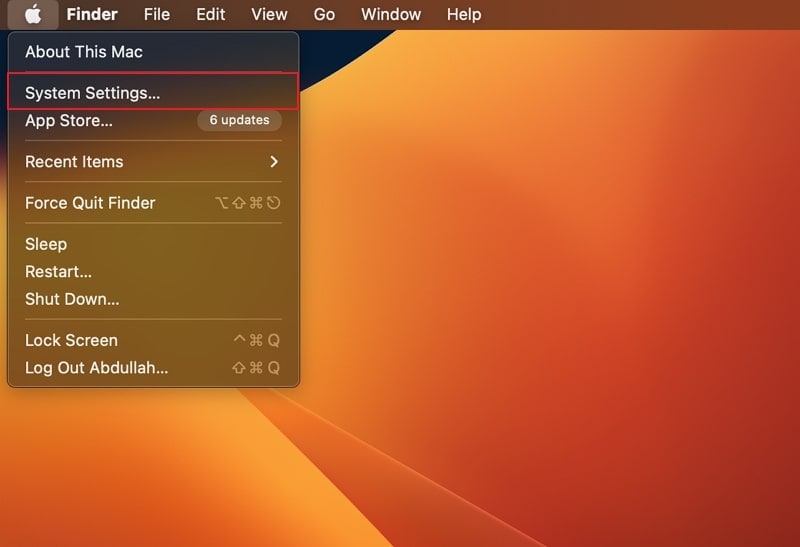
Step 2: As a new window opens, continue by clicking on your name to access your Apple ID details. With the screen displaying all options, scroll down to find the respective device.
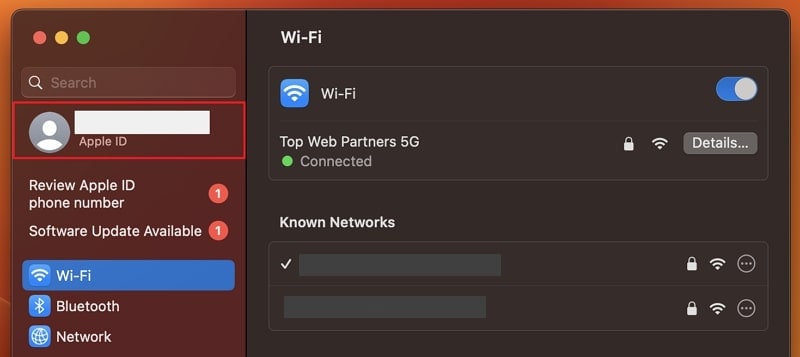
Step 3: Once you continue to the next screen, find the “Remove from Account” button on the bottom of the options and lead to the following prompt. You will have to tap on “Remove” to execute the process.
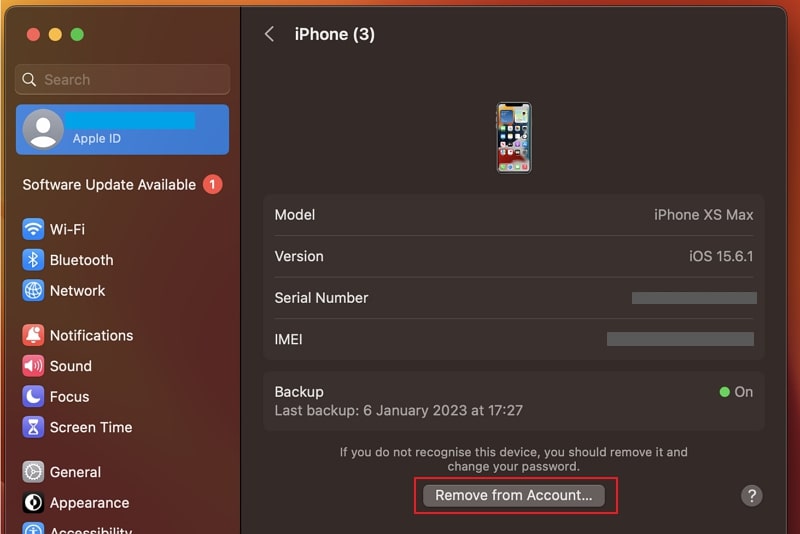
Method 3: Using the Apple ID Account Page on the Web
This process can also be performed using the Apple ID account page from the web browser. For that, you will have to access the webpage from this link .
Step 1: As you access the webpage and log into it with your Apple ID, continue to the homepage. Lead to the “Devices” section on the left panel to open a new screen.
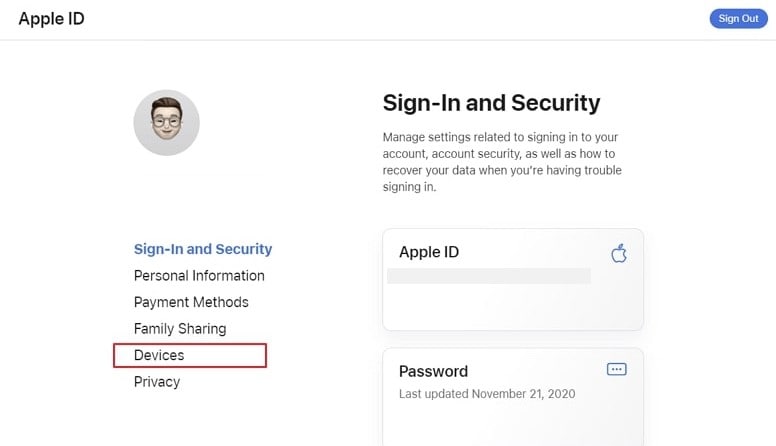
Step 2: Following this, select the Apple iPhone 13 device that you want to remove from the Apple ID. As a new window opens, select “Remove from Account” and continue to execute this process.
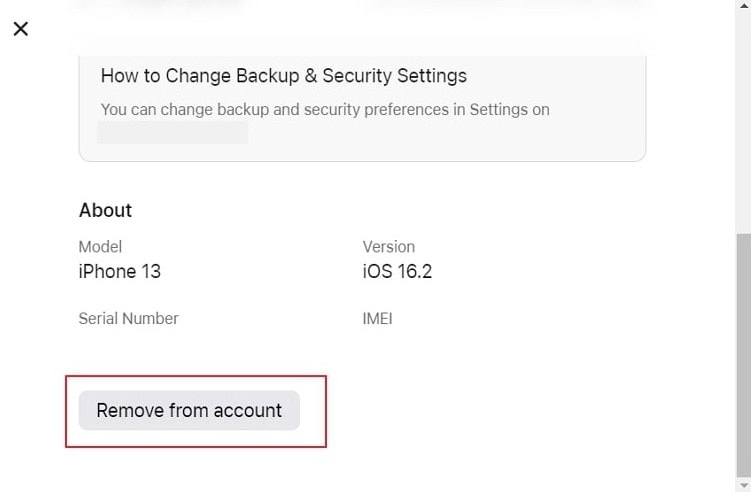
Method 4: Using the iCloud
iCloud can be another source to remove devices from Apple ID. To know how this method can be used to remove the Apple iPhone 13 device from Apple ID, look into the provided steps:
Step 1: Launch iCloud.com on your computer from a web browser and continue to log in with your Apple ID.
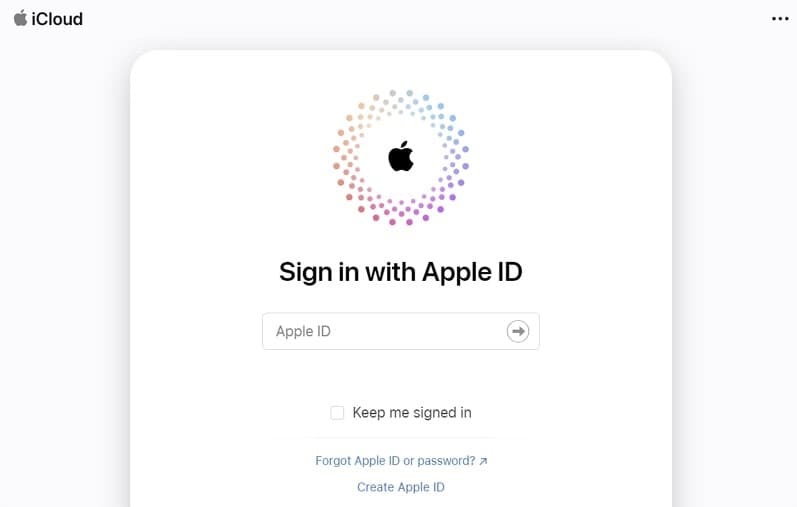
Step 2: As you get into the homepage of your iCloud, select the “Thumbnail” button on the top-right of the screen. After that, choose the “Find My” feature from the available options in the list.
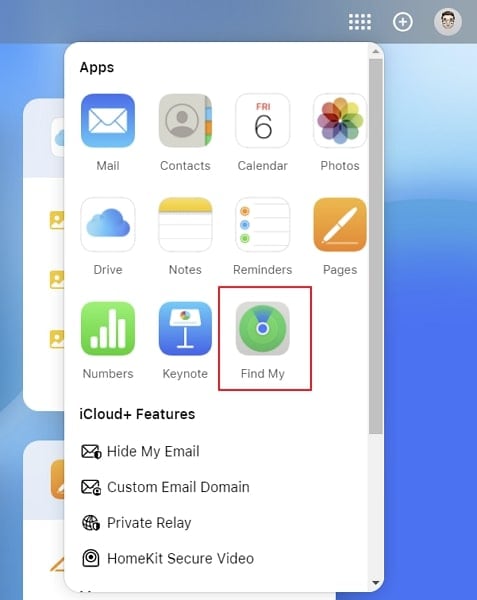
Step 3: You will find yourselves on a new screen where you have to click the “All Devices” option. Select the Apple iPhone 13 device that you wish to remove to open a new screen. Select the “Remove from Account” option to remove the Apple iPhone 13 device from the Apple ID.
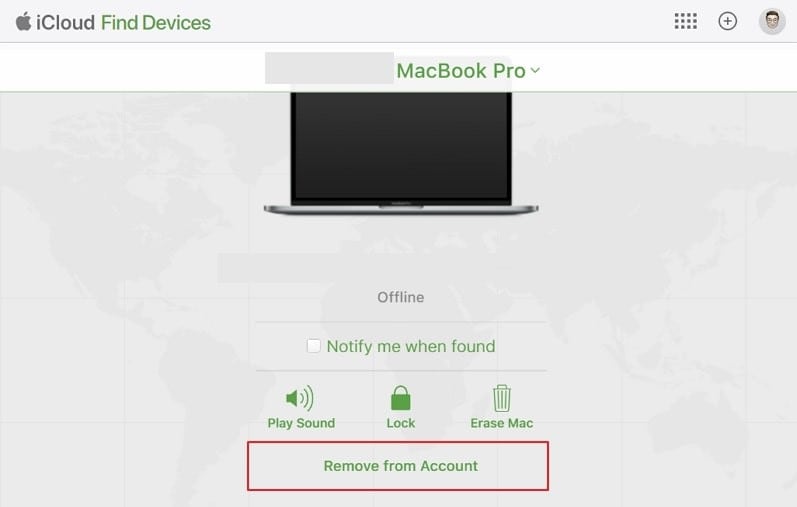
Part 3: Bonus Tips: Forgot Your Apple ID Password? Here’s What To Do
While you can remove a device from the Apple ID, you might come into re-using it again for some purpose. If it comes to such a condition and you have forgotten your Apple ID password, the Apple iPhone 13 device would be useless. The best thing to do in such a situation is to go with Dr.Fone - Screen Unlock (iOS) for unlocking your device.
Dr.Fone - Screen Unlock (iOS) is designed to provide confused iOS users with a proper direction to easily unlock their locked Apple devices. The tool is built to provide solutions in situations where you can bypass Activation Lock or easily unlock your Apple ID. It is an excellent tool serving Apple users with the option of removing all kinds of locks.
Key Features of Having Dr.Fone - Screen Unlock (iOS)
It is great to learn more about the tool to process the method perfectly. For that, look into the features presented next for a better understanding of Dr.Fone - Screen Unlock (iOS):
- It provides support for the latest iOS version and Apple devices.
- The tool supports removing all kinds of locks, including Face ID, Touch ID, screen time passcode, etc.
- It can also remove Apple ID from the Apple iPhone 13 device without requiring iTunes.
Steps For Unlocking Apple ID From Apple Device with Dr.Fone - Screen Unlock (iOS)
We will now shift to knowing more about how to bypass Apple ID from a device whose password is forgotten:
Step 1: Launch Dr.Fone and Open Screen Unlock
To start the process, it is best to download and install the latest version of Wondershare Dr.Fone on your computer. As it launches, continue to select “Screen Unlock” from the options.

Step 2: Proceed to Remove the Apple ID
You will have to continue to the option of “Remove Apple ID” from the list to unlock the Apple ID.

Step 3: Trust Computer and Start Unlocking
Turn on your Apple device and continue to trust the Apple iPhone 13 device it is connected to. After tapping on “Trust,” you can continue with the process. On your computer’s screen, click on “Unlock Now” to proceed next.

Step 4: Enter Recovery Mode and Start
Put your Apple device into the Recovery Mode by following the on-screen instructions on the computer’s screen. As it is done, the unlocking process starts automatically. The process will be completed in a few seconds, and the prompt will display the completion of the method.
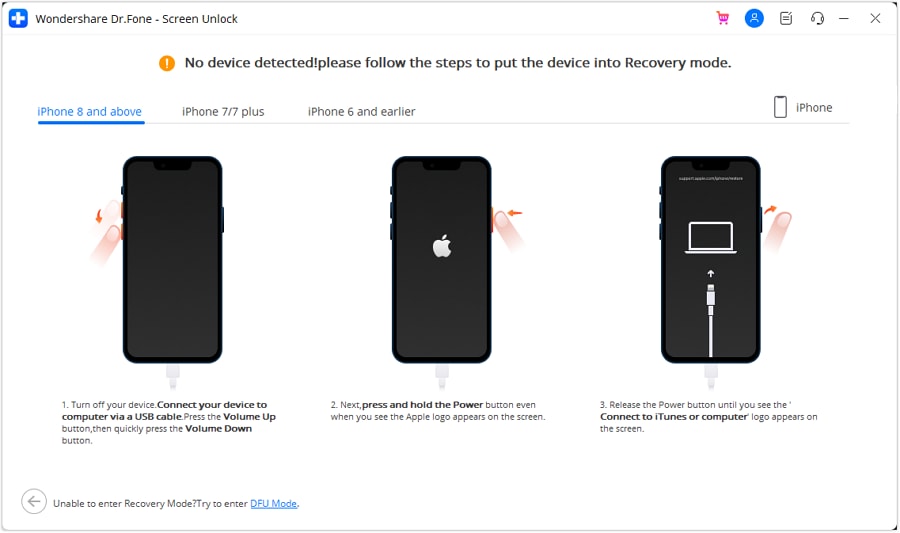
Part 4: FAQs about Apple ID
- How to create a new Apple ID on an iPhone?
Open the “App Store” and click the “Profile” icon on the top-right. You must continue clicking on the “Create New Apple ID” button after you have signed out of iCloud of your previous ID. Provide all required details for creating the Apple ID and confirm the process.
- How do I add a device to My Apple ID?
To add a device to your Apple ID, you have to configure it first and log in with your existing ID from there. This is how it can be added to the Apple ID list of devices.
- How many devices can I add to My Apple ID?
Apple ID allows you to connect ten devices under the same account. In these ten devices, there cannot be more than five computers associated with the Apple ID.
- Why can’t I create a new Apple ID?
If you are unable to create a new Apple ID, it is possible that you would have exceeded the maximum number of Apple IDs that can be set up with iCloud on one device.
- How can I Find My Apple ID password?
There is no way to find your Apple ID password on your devices. If that is the case, you will have to reset the password or remember it so that you can use it for a purpose.
Conclusion
You have learned proper techniques for removing devices from your Apple ID in this article. With all these methods, you can remove any device from Apple ID without requiring additional tasks. This article has also helped you with a tool to help you in situations where you have forgotten your Apple ID password. Dr.Fone - Screen Unlock (iOS) is an excellent option for removing security locks from iOS devices.
Also read:
- [New] 2024 Approved Explore the Top 15 YouTube Binge Spots for Anime Lovers
- [New] In 2024, End Scenes Unlocked Tutorials to Enhance Viewing Experience
- [Updated] Elevate Your Online Interactions Master Microsoft Teams Snap
- [Updated] Strategies for Finding High-Impact Keywords for YouTube Content
- Apple ID Unlock From iPhone 7? How to Fix it?
- Choosing: CPU Upgrade Vs. GPU Boost Priority
- Detailed Guide on Removing iPhone 14 Activation Lock without Previous Owner?
- Guía Definitiva Para Transferir Películas De DVD a Mac Sin Pérdida: Big Sur Incluido
- In 2024, How to Change Credit Card from Your Apple iPhone 14 Pro Max Apple ID and Apple Pay
- In 2024, How To Fix Apple ID Verification Code Not Working From iPhone 11
- In 2024, How To Unlink Apple ID From Apple iPhone 14 Plus
- In 2024, Why Apple Account Disabled On your Apple iPhone 13 Pro Max? How to Fix
- The Essentials of Using Llama 2 for Business Success
- Title: How To Remove the Two Factor Authentication From iPhone 13
- Author: Alma
- Created at : 2024-12-04 16:12:12
- Updated at : 2024-12-06 16:04:03
- Link: https://apple-account.techidaily.com/how-to-remove-the-two-factor-authentication-from-iphone-13-by-drfone-ios/
- License: This work is licensed under CC BY-NC-SA 4.0.
